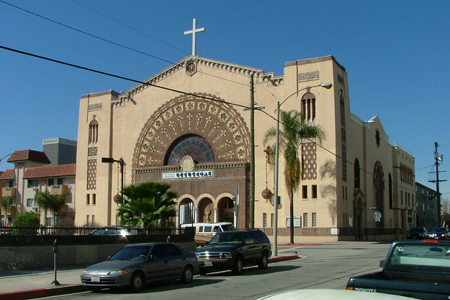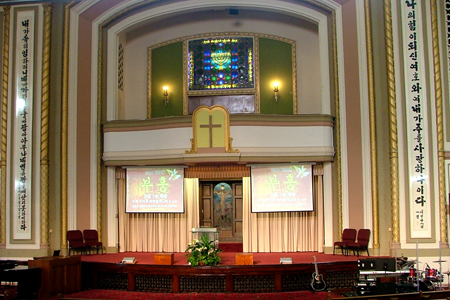| |
 |
 |
 |
| Comment on this report, or find other reports. |
 |
| Our Mystery Worshippers are volunteers who warm church pews for us around the world. If you'd like to become a Mystery Worshipper, start here. |
 |
| Find out how to reproduce this report in your church magazine or website. |
|
|
| 1915: Korean
Philadelphia Presbyterian, Los Angeles, California, USA |
 |
 |
 |
Mystery Worshipper:
Amanda B. Reckondwythe.
The church:
Korean Philadelphia Presbyterian, Los Angeles, California, USA.
Denomination:
Korean Presbyterian Church Abroad (KPCA), not to be confused
with the Korean Presbyterian Church in America (PCKA) or the
Korean American Presbyterian Church (KAPC). Chinese Jesuit missionaries
brought Catholicism to Korea in the 18th century; Presbyterian
missionaries from Scotland and the United States arrived the
century following. After the partitioning of North and South
Korea in 1945, churches in North Korea were dissolved. But rapid
growth in South Korea of the Presbyterian Church has resulted
in a number of schisms; there are over 100 separate Presbyterian
denominations in South Korea today. A good discussion can be
found at
this website.
The building:
A former synagogue dating from 1924, the work of architect S.
Tilden Norton. Norton was responsible for many of the most outstanding
historical buildings in Los Angeles (or whatís left of them),
including the now-closed Los Angeles Theater, the Fox Building
(now the Western Jewelry Mart), and the old Financial Center
on Spring Street, as well as many Jewish religious structures.
The Presbyterians acquired the building in 1960 when the Jewish
congregation relocated to new quarters. The church still looks
like a synagogue from the outside, with Hebrew inscriptions
carved into the faÁade and stone menorahs flanking the main
door. Only a large cross perched at the apex of the roof marks
the buildingís true nature. Inside, one passes through a foyer
into a large, bright auditorium in which pews are arranged in
a semicircle around a stage. There is also a balcony. At the
back of the stage is a stained glass rendering of the Crucifixion,
flanked by wood panels. Twin projection screens stand in front
of light brown curtains. Over the stage is a balcony with a
stained glass window depicting a menorah. To the left of the
stage are a grand piano and electronic organ; to the right are
a digital keyboard and drum set. A wooden communion table was
unceremoniously shoved into a corner; there was no communion
at todayís service.
The church: As its name implies, the church ministers to a predominantly ethnic Korean-American congregation. I was not able to determine any of their ministries or outreaches. There are two services each Sunday in Korean, plus a third service in English held in the gymnasium.
The neighborhood:
The church is located on New Hampshire Avenue at West Fourth
Street, in the area called Koreatown from the large number of
Korean-owned businesses located there. The sharp-eyed tourist
with a nostalgic bent will be keen to take in such landmarks
as the old New York-style early 20th century apartment buildings
that line Wilshire Boulevard, with names like the Asbury and
the Gaylord, as well as a motorcar repair shop dating from 1928
that still stands on Berendo Avenue in all its original glory.
The church is on a residential street and is flanked by apartment
buildings and semi-detached homes.
The cast: The Revd Shin Kim, pastor. Pastor Kim was assisted by a gentleman and a lady whose names I did not get. Both gentlemen wore a black suit, white shirt and conservative necktie; the lady wore a light purple skirt with matching jacket. There was also a choir of eight singers dressed in peach colored robes with a burgundy inlay over the shoulders and down the front.
The date & time: Sunday, February 28, 2010, 9.00am.
What was the name of the service?
I donít know Ė the churchís signboard was entirely in Korean.
How full was the building?
I counted about 350 seats. There were 15 people present, not including the clergy, choir or ushers.
Did anyone welcome you personally?
An usher said, "Good morning. Welcome." He advised me of the English language service, but I said that Iíd prefer to sit in on the Korean service even though I probably wouldnít understand anything.
Was your pew comfortable?
Yes. The pews were divided into individual fold-down seats with blue upholstered cushions and arm rests.
How would you describe the pre-service
atmosphere?
Quiet. Soft music was playing over the PA system. Just before the service started, the organist played a soft prelude while the clergy and choir took their places.
What were the exact opening words of the
service?
I donít know Ė the pastor gestured that everyone should stand and then recited a prayer in Korean.
What books did the congregation use during the
service?
None. Everything was projected in Korean onto the screens. There was a handout, but it was in Korean and so I didnít take one. During one of the scriptural readings (John 8:12-20 Ė Jesus is the light of the world), an usher thrust a Korean-English Bible (New International Version) into my hands so I could follow along. That was nice, I thought.
What musical instruments were played?
A young lady accompanied the hymns on the organ and the choir anthem on the piano. She moved over to the digital keyboard for one modern song.

Did anything distract you?
Not understanding the Korean, I busied myself looking for leftover signs of Judaism and found plenty, from the menorah in the stained glass window to Star-of-David patterns in the heating system grillwork. I spotted a young gentleman in a black leather jacket and changed my seat so as to sit next to him, thinking that he might be able afterward to tell me in English what had transpired in Korean.
Was the worship stiff-upper-lip, happy clappy, or
what?
A very sober hymn sandwich. Except for one song, the hymns were all traditional sounding, although I didnít recognize them save for one that was set to Beethovenís "Ode to Joy." Iím pretty sure that the choir anthem was the Korean version of "Bringing In the Sheaves." Iím also pretty sure that the Gloria was recited after the opening prayer, judging from the general heft of it. At one point a lady was brought forward and the congregation sang a hymn while stretching out their hands toward her; she was then given a bouquet of flowers. (I meant to ask what this was all about but forgot to.) The exchange of peace consisted of a handshake and a bow; the leather-jacketed young gentleman wished me peace, as did the usher who had given me the Bible.
Exactly how long was the sermon?
22 minutes.
On a scale of 1-10, how good was the preacher?
8 – Pastor Kim was passionate yet controlled. There was no Bible thumping, pacing about, or fainting in the Spirit, but he raised and lowered his voice often and made good use of his hands.
In a nutshell, what was the sermon
about?
(As explained to me later) Jesus is the light of the world. To be happy, we must be happy in Jesusí light. The trappings of the world will blind us.
Which part of the service was like being in
heaven?
I had fully intended to sit in on the Korean service only until it was time for the English service, but I became so enthralled by what I was witnessing that I decided to stay. I didnít understand a word (except for the occasional Jesu Christo and Amen) but I was inspired by the dignity of the service and the sincerity of the congregation.
And which part was like being in... er... the other place?
I confess that I was attracted to the leather-jacketed young man for reasons besides his potential usefulness as a translator. (Why am I reminded of Matthew 4?) I do wish, though, that I understood Korean, as I would have wanted to appreciate more fully what I was witnessing in the service.
What happened when you hung around after the service looking lost?
After the final blessing, everyone left, including my leather-jacketed seatmate. But one of the ushers came over to me and thanked me for coming. I asked him the pastorís name and to tell me in a few words what the sermon had been about. He was happy to oblige. As we were talking, both the pastor and the other gentleman who had been assisting him came over and shook my hand, thanked me for coming, asked me where I was from, etc. The pastor offered to tell me what his sermon had been about, but I said that the usher had already done so. He accompanied me out to the porch and said that Iíd be welcome to return the next time Iím in town.
How would you describe the after-service
coffee?
There was none. I breakfasted at a nearby International House of Pancakes, where I enjoyed a very nice veggie omelet (no potatoes, no toast Ė Miss Amanda is dieting).
How would you feel about making this church your regular (where 10 = ecstatic, 0 = terminal)?
8 – If I were an ethnic Korean and lived in Los Angeles, I would seriously consider it. Everyone treated me so nicely, and everything was done with such dignity. I do, however, prefer a bit more ceremony, as I have seen in other Presbyterian churches.
Did the service make you feel glad to be a
Christian?
Yes. If philadelphia means brotherly love, then this church lives up to its name.
What one thing will you remember about all this in seven days' time?
The warm welcome given to a visitor not a part of the hostsí ethnic group. |
|
|
 |
 |
 |
| We rely on voluntary donations to stay online. If you're a regular visitor to Ship of Fools, please consider supporting us. |
 |
 |
 |
| The Mystery Pilgrim |
 |
| One of our most seasoned reporters makes the Camino pilgrimage to Santiago de Compostela in Spain. Read here. |
 |
 |
 |
| London churches |
 |
| Read reports from 70 London churches, visited by a small army of Mystery Worshippers on one single Sunday. Read here. |
| |
|
|
|
|


